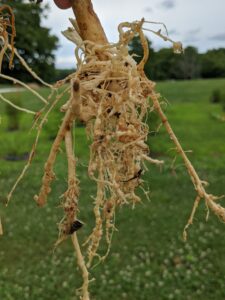Root-knot nematodes cause severe damage in vegetable production. Its infection results in root swellings called galls that interrupt plant water and nutrient uptake (Figure 1). Aboveground, plants show symptoms that include stunted growth, wilting, and leaf yellowing. In addition to root-knot nematodes, several other plant parasitic nematodes can cause damage to vegetable roots. Damage to the roots may affect plant growth directly or make plants more susceptible to other soilborne pathogens.

Figure 1. A root-knot nematode infected watermelon root.
A field survey for plant parasitic nematode is currently going on in Indiana. Root-knot nematodes (RKN) have been found across Indiana, where it causes damage to watermelons and cantaloupes, both open-field and high tunnel-grown tomatoes, and on carrots grown in high tunnels.
We have identified both southern (Meloidogyne incognita) and northern RKN (M. hapla). There is no clear geographic division of the two RKN species in Indiana. Southern RKN can be found in northern Indiana in high tunnels, while northern RKN was found on carrots grown in southern Indiana. The survey also found an M. incognita virulent strain on a grafted tomato that can break tomato Mi-gene resistance.
In addition to RKN, we frequently found spiral, stunt, and lesion nematodes in the soil samples.
We are continuing this survey in Indiana. If you are interested in participating, please contact Wenjing Guan at guan40@purdue.edu or (352) 870-4696 (text).
We also have a web survey to understand your preference for controlling RKN. The survey takes no more than five minutes. Thank you very much for participating in the study.
Survey link: https://purdue.ca1.qualtrics.com/jfe/form/SV_73bKsHblfzLZQdU
The project is funded by the United States Department of Agriculture National Institute of Food and Agriculture, grant no. 2021-51181-35904.